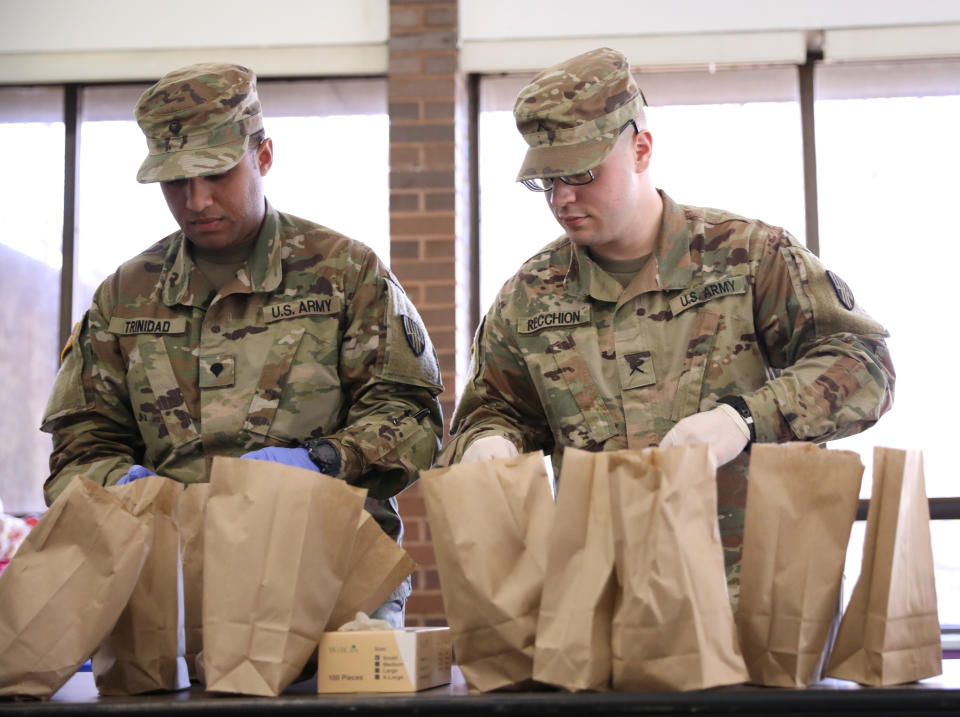The military should be mobilized for the coronavirus pandemic
Gov. Andrew Cuomo’s decision to call up the New York National Guard and the Army Corps of Engineers to find buildings to convert to makeshift hospitals is the right one. As hospitals around the country face the prospect of unmanageable surges of patients stricken with COVID-19, military medical units may be crucial. Our regular health care system simply cannot cope alone.
The U.S. health care system is built around a set of assumptions that limit its capacity to cope with disaster. Like a hotel room bed, an empty hospital bed is a loss center. So increasingly hospital systems have reduced their numbers of beds in order to maximize income. Considering ever-increasing operating costs and highly capitalized equipment, this is a rational strategy. It dictates an emphasis on high-tech medicine and profitable services like same-day procedures for the well-insured to the neglect of prevention and public health. But it is also a sunny-day strategy that quite deliberately leaves little margin for error. Intensive care units are usually close to full.
Since World War II and the outbreak of the Cold War, the military has relied on the Army National Guard and Reserve to surge in the event of hostilities. The Army organized many of its Reserve units to provide logistical support to the frontlines. The units for medical support were set up in the Reserve commanded by a medical corps major general.
The units included large hospitals, frontline clinics and medical supply warehouses that could be mobilized and deployed when needed. Physicians, nurses and many other professionals staffed the units and trained on weekends and in summers to support the mission. The Army relied on having skilled and trained professionals who worked in the civilian sector and were proficient in their specialties to mobilize when needed.

The hospital units in the Army Reserve have stockpiles of hospital beds, ventilators and other medical equipment, all of which could be used in emergencies like the coronavirus pandemic. FEMA has the authority to call up these units and set up treatment centers in critical areas. The Reserve medical units are trained to configure buildings such as schools and warehouses as treatment centers as well as setting up mobile hospitals.
As the pandemic spreads, it is certain there will be a shortage of both general medical and ICU beds. The gap can be managed by the medical units in the Army Reserve. Moreover, these medical units are set up to train and support doctors and other health professionals to get up to speed to treat the kinds of problems that will develop with the coronavirus illness. Conditions associated with pandemic coronavirus also complicate force protection. But the Army already has extensive experience standing up assets in pandemic environments, as was done in Liberia during the Ebola outbreak in 2014.
These Reserve units should be mobilized immediately to train and staff health care professionals before the numbers of sick patients mount and the capacity of the hospitals across the country has been exceeded. The president has the authority to call up 200,000 reservists on his own, then Congress can go to higher stages of mobilization, which will likely be needed.
There is another disconcerting sense in which military medicine is more prepared for extreme situations than civilian medicine. Medical professionals may well be confronted with a series of triage decisions for which they are unprepared. With critical care units typically operating near capacity, hospital leaders are already contemplating explicit rationing. In keeping with its training for disaster scenarios, military medical culture is better adapted to circumstances apt to crush morale in the civilian world.
But the sooner mobilization takes place the less likely it will be that such unbearable decisions will have to be made.
Our regular health care system is based on normal, best-case scenarios. But military medicine plans for worst-case scenarios. And that is what we face now.
Stephen N. Xenakis, a psychiatrist and retired Army brigadier general, serves on the executive board of the Center for Ethics and the Rule of Law at the University of Pennsylvania and is an adjunct professor at the Uniformed Services University of Health Sciences. Follow him on Twitter: @SteveXen
Jonathan D. Moreno is a professor of medical ethics and health policy at the University of Pennsylvania.
Read more from Yahoo News:


